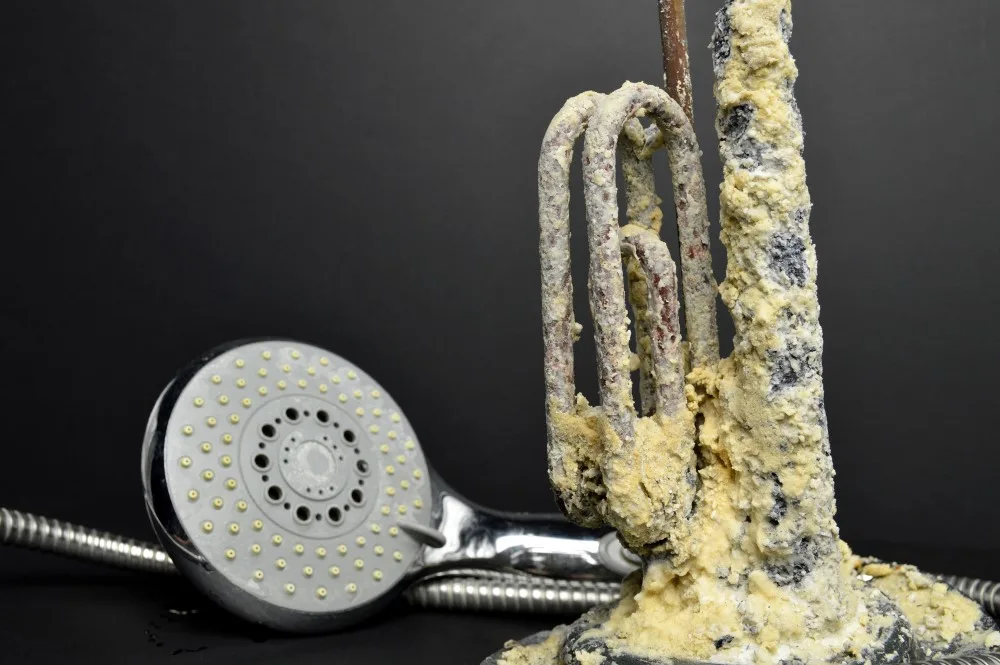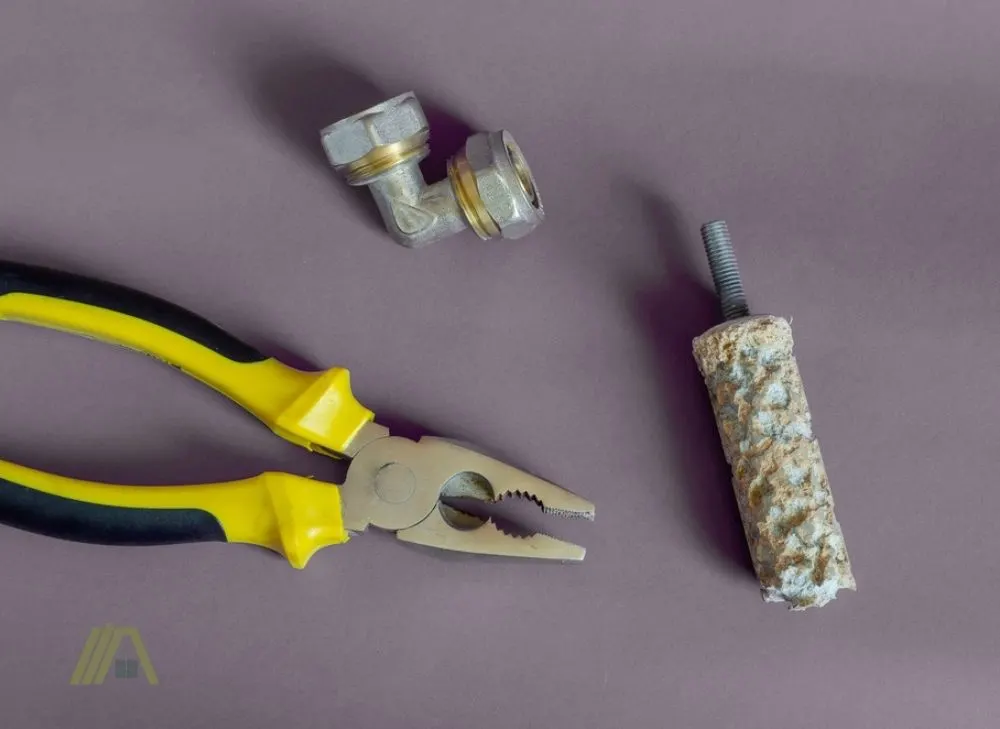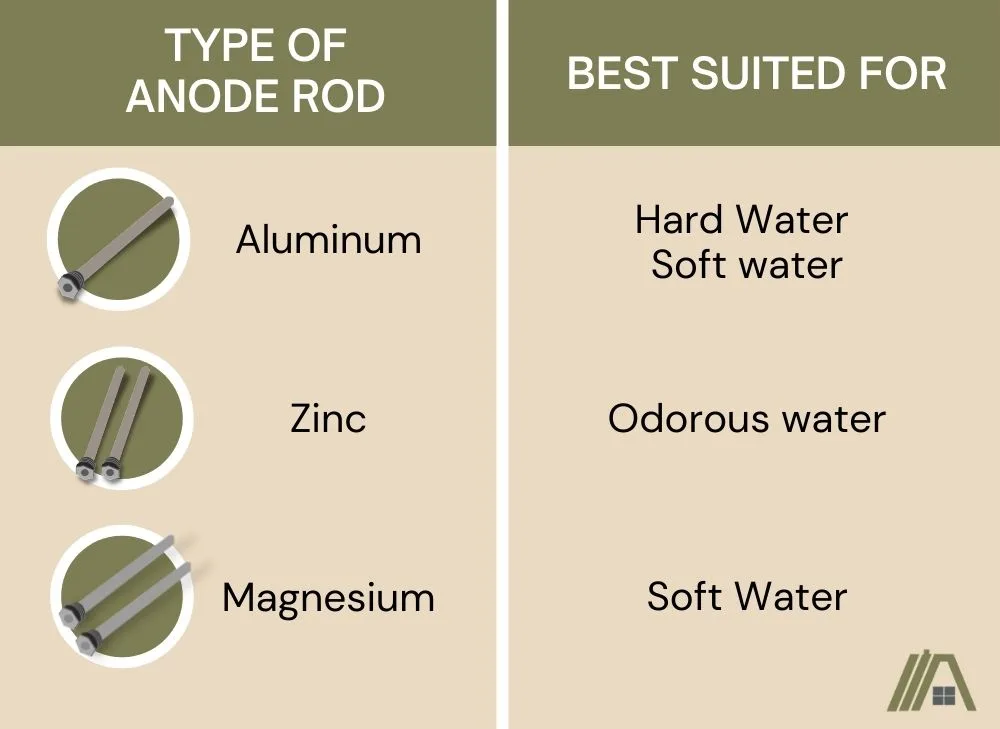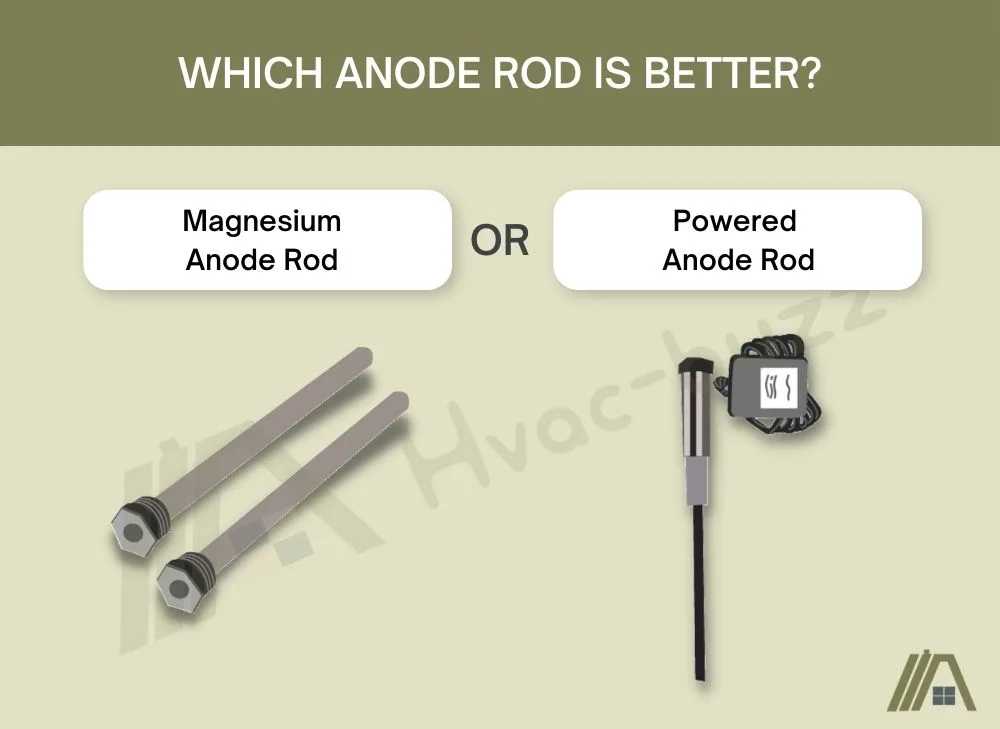Hard water can have a significant impact on your household, making even something as simple as lathering your shampoo an impossibility. This makes them worthwhile for most homeowners despite the disadvantages they bring with them. One such disadvantage is the impact of a water softener on your water heater tank.
The function-related consequences of a water softening system on your water heater’s storage tank are negligible if you make proper use of an anode rod. The cost of a water softener is the longevity of your anode rod, but with the right type of rod and regular checking, there is no reason why you cannot use a water softener successfully.

Water softeners cause anode rods to corrode faster, shortening their lifespan. However, there are benefits to softening water that make it worth it. Just keep in mind that a magnesium rod is the best option with a softener and will need checking every 6 months with more frequent replacing.
Hard Water Causes Lime-Scale Build-Up
The “hardness” of your water is defined by its mineral content; by how much magnesium and calcium are in the water. The clumping of these minerals will result in a rapidly occurring limescale build-up that will impact your tank, water pipes, fixtures, and even your own body.
The water should be safe to drink or cook with (maybe even beneficial), but the mineral content will damage your hair, dry your skin (hard water is not your friend if you suffer from eczema), and prevent lathering in soaps (including for dishes and clothes).

Limescale build-up creates blockages in your water pipes that can even lead to cracking. It sabotages your water pressure, meaning toilets that won’t flush and water supply problems in washers and showers, particularly those on higher levels in the house.
Limescale causes blockages in your fixtures (taps, showerheads, drainage pipes, etc.), and the sediment in your water heater tank can (after some time) result in less space for water in your heater’s tank. Overall, limescale will cause damage and reduce the efficiency of water use in your house.
You can remove limescale, but the frequency at which you have to do it with hard water without a water softener becomes unsustainable.
Limescale can also build up on your anode rod, preventing it from sacrificial corrosion and inhibiting its function, which results in yet more damage to your water heater.
Thus, a water softener can aid an anode in its function inside the water heater storage tank.
Can a Water Softener Replace an Anode Rod?
Even though anode rods and water softeners are both designed to protect you water heater tank from the contents of the water it holds, they do so in different ways and having one does not preclude the necessity of the other.
Softening your water can eliminate the risk of hard water minerals building up and compromising the metal of your water heater, but in so doing, it adds sodium to the water.
In fact, softened water contains quite a high concentration of sodium. Unfortunately, this element is an electrolyte and can accelerate the corrosion process.
So, far from not being able to replace the anode rod, a water softener actually increases the need for one.
Effects of Water Softener on Anode Rods
As mentioned, sodium is a corrosive substance, much like hard water’s minerals are.
Besides introducing a substantial amount of sodium to your water, water softening also leads to the lowering of water pH, and the elimination of problematic minerals in hard water.
As far as the effect of softened water on an anode rod goes, the sharp increase in sodium affects the lifespan of the anode rod since it causes it to corrode at a much faster rate. If the rod is not replaced in time, the water heater will begin to rust as well.

Typically, sacrificial anode rods can last about five years. In softened water, however, anode rods last only two to three years.
If your water is over-softened, your anode rod may only last six months.
In addition to this issue of corroding too quickly, you can have the opposite problem: the rod does not corrode fast enough. How does this make sense?
Well, typically, a relatively reactive metal is a good option for anode rods. This is because they are able to cope with the number of corrosive elements in the water, keeping them away from the tank, but they are not so reactive that they “overprotect” the tank, corroding needlessly fast.
In comparison, the vast quantity of corrosive elements in softened water requires a very reactive anode rod that will be able to keep up and not corrode slow enough that some of these elements are still able to attack the tank.
Performance of Sacrificial Rods in Softened Water
Sacrificial anode rods are made up of a material that is more reactive than the material of the water tank. This high reactivity attracts corrosive elements to the anode rod. As a result, the anode rod is corroded instead of the metal of your water heater tank.
All sacrificial anode rods serve this one purpose. But since they can consist of a variety of different materials, some materials may work better for softened water than others.
Aluminum Anode Rods
Aluminum anode rods are better for hard water that has a higher pH and higher mineral contents.
This is because aluminum is less reactive than other anode rod types.
Because of their lower reactivity, they can find a balance between preferentially corroding and lasting longer.
A magnesium rod would quickly be corroded in hard water.
Aluminum rods are also ideal for naturally soft water that lacks lots of minerals and corrosive elements.
Zinc Anode Rods
Thanks to their special properties, zinc anode rods are best-suited for odorous water.
Odor in water commonly forms due to the presence of sulfate-reducing bacteria in your water. While the bacteria are basically harmless, they produce hydrogen sulfide gas, which has a rotten egg-like odor that can be very bothersome.
An anode rod containing zinc can produce zinc ions as it corrodes. These ions can quickly kill these bacteria and eliminate the odor.
However, since zinc anode rods are typically zinc-aluminum alloys, they are not the best option for softened water.
Magnesium Anode Rods
Although they perform the same function, magnesium and aluminum rods differ in various ways.
For example, magnesium is far more reactive than aluminum.
Because of this, magnesium anode rods are best for softened water that has a lower pH and large amounts of corrosive elements.
The magnesium anode rod is reactive enough to keep up with high volumes of corrosives and thus can better protect water heater tanks from softened water.

Are Powered Anodes Suitable for Softened Water?
Unlike sacrificial anode rods, whose ability to protect your water heater depends on the type of water and the type of metal the rod is made of, powered anode rods are suitable for all kinds of water.
They are able to adapt to whatever water type they are submerged in by adjusting their voltage to the resistance of the water.
The current they produce provides protection against corrosives, even the high amounts of corrosives in softened water.
Magnesium vs Powered Anode Rod: Which Is Better?
Their Performance in Softened Water
While magnesium anode rods are suited for this environment because of their high reactivity, powered anode rods can perform equally well in any environment.

Either one can protect your water heater from corrosives in softened water.
While their performance is fairly evenly-matched, either one may come out on top when you factor in their additional benefits.
For magnesium anode rods, their benefit comes from adding magnesium ions to your water supply as the magnesium anode rod corrodes. Adding magnesium to your diet can improve your overall digestive health.
For powered anode rods, their main additional benefit comes from the elimination of bad egg smells in your water. Not only can the current protect your water heater tank from corrosion, but it can also kill sulfate-reducing bacteria in your water.
Comparing Lifespan
The main difference between a powered anode rod and a magnesium anode rod is how long they last.
While a magnesium anode rod is made to corrode over time, a powered anode rod will not deteriorate. Like all devices, though, a powered anode rod will malfunction at some point.
However, a magnesium anode rod in soft water may last only three to five years, while a powered anode rod can last from six to twenty years.
Price
Because powered anode rods last longer, use more complex technology, and are suited for all types of water, their prices are much higher than the prices of magnesium anode rods.
You can get a magnesium anode rod for $15-$60. A powered anode rod, on the other hand, will cost you anywhere from $100 to $250.
Maintenance
If a sacrificial anode rod fully corrodes, the corrosives in the water heater tank will immediately begin to corrode the metal of the tank.
Therefore, the maintenance of a magnesium anode rod includes yearly checks as well as replacing the rod every three to five years to prevent corrosion of your water heater tank.
The anode rod replacement cost depends on the state of the anode rod as well as who does it. The cost for professional replacement is often $200-$300.
Unlike magnesium anode rods, powered anode rods do not require much maintenance. They do utilize electricity, however, the cost of running a powered anode rod can be as low as about $1.36 a year.
Table Summary
| Magnesium anode rods | Powered anode rods | |
| Price | $15-$60 | $100-$250 |
| Protection from corrosion | Great in soft water. | Great in all types of water. |
| Lifespan | 3-5 years. | 6-20 years. |
| Need power outlet | No. | Yes. |
| Operational cost | Depending on how often it needs to be replaced. | About $1.36 per year. |
| Need to be replaced | Yes, more often. | Possibly, much less often. |
| Additional benefits | Magnesium is beneficial to digestive health. | Powered anode rods can eliminate bad egg smells. |
Which Anode Rod Should You Get for Softened Water?
While both options are good, magnesium anode rods are a better fit for those who are looking for a lower purchasing price and are willing to do the required maintenance and replace the rod more often.
Those who know their way around water heaters would save money installing and replacing this anode rod and would most likely have no problem with the maintenance required.
I recommend the Blue Lightning Magnesium Flexible Anode Rod (amazon link) for its flexibility and high ratings.
Powered anode rods are best for those who are looking for a longer lifespan and would prefer not to check and replace their anode rod.
It would also be ideal for those who struggle with bad egg smells in their water but would like an anode rod that lasts longer than a zinc anode rod would. However, it is not ideal for areas with frequent power outages or power surges.
I recommend the Corro-Protec™ Powered Anode Rod (amazon link) for its high ratings and the large range of compatibility. I also recommend you check out my ultimate powered anode rod guide to find out everything you need to know about these devices.
Consider a Stainless Steel Water Heater
Steel, glass-lined, tank-type water heaters are the most common type of water heater used in the USA. However, you can now get units with stainless steel tanks. These tanks are lighter (no need for a glass lining) and have the supreme benefit of being made from a corrosion-resistant metal alloy.
By using a stainless steel tank with a water softener, you eliminate the problem of your tank corroding in the presence of sodium ions. This in turn, makes it unnecessary to protect the tank with a sacrificial anode.
If you plan to use a water softener and know that you will have to replace an anode rod frequently, maybe you would prefer to add a little money to the budget and get a stainless steel tank instead.
Sources
https://www.healthline.com/health/hard-water-hair-damage-treatment
https://www.ncbi.nlm.nih.gov/pmc/articles/PMC3927171/
https://www.functionofbeauty.com/blog/new/hard-water-effects-on-hair/
https://www.culligan.com/blog/effects-of-hard-water-on-hair-and-skin
https://www.usgs.gov/special-topics/water-science-school/science/hardness-water
https://whirlpoolwatersolutions.com/learning-center/water-softeners/hard-water-the-hard-facts/
https://www.harveywatersofteners.co.uk/blog/link-between-limescale-and-hard-water/
https://www.scientificamerican.com/article/how-do-water-softeners-wo/
https://waterheaters-sandiego.com/does-a-water-softener-affect-a-water-heater/
https://www.plumbingsupply.com/understanding-water-heater-anode-rods.html
https://www.nebraskyplumbing.com/everything-you-need-to-know-about-a-water-heater-anode-rod/
https://wateriit.com/what-anode-rod-to-use-with-water-softener/
https://www.bepeterson.com/7-reasons-why-stainless-steel-water-tanks-are-popular
https://www.corroprotec.com/blog/water-heater-anode-rod/




Tuesday 27th of February 2024
We are having a problem with water spurting out of the faucet - hot water side only- after the a water tank heating cycle (like you get when there is air in the lines). I checked the water temperature and it was 118 degrees so it does not appear to be overheating. We have an expansion tank. Both water heater and expansion tank are only 6 months old , but the problem started since it was installed. My plumber replaced the control valve, but still having the problem. He thinks the caroding anode rod is giving off some sort of gas. Your thoughts
Michael Scott
Tuesday 26th of March 2024
After closing the tap how long does it take for the spurting to start again? Very unlikely it is the anode rod that is causing the problem.
Does it sprurt on all taps? Try turning the water heater off for the day and see if it still spurts the next day.